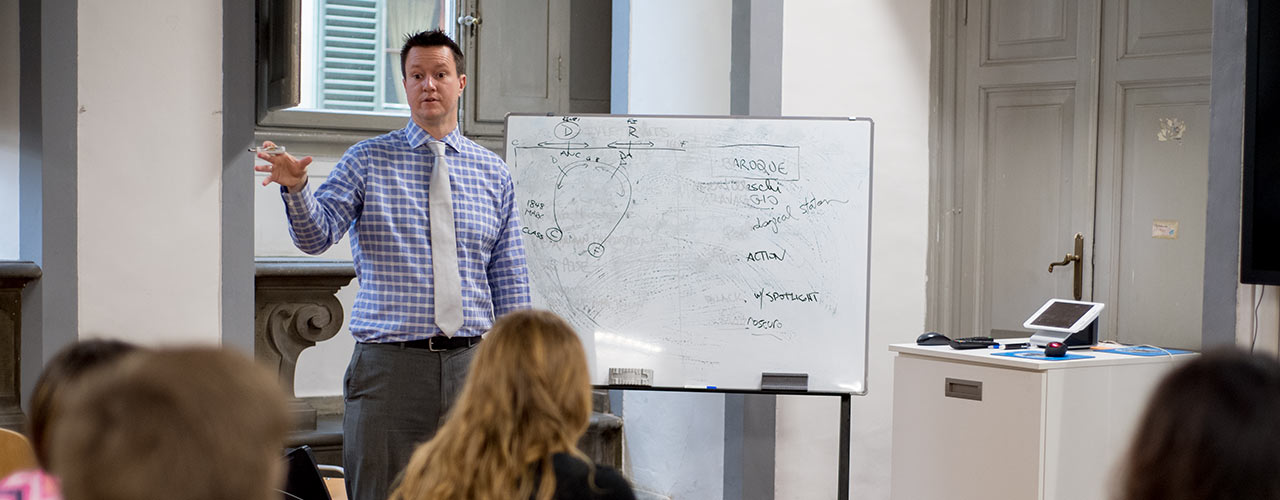
About Us
Each of the seven History and Government majors provides the balanced education prized by employers and graduate schools: a strong core of required courses, electives that allow you to specialize and explore further, and a capstone project that brings together all elements of your academic experience. Our department also offers general education classes that prepare every Cedarville student to influence the culture for Jesus Christ.
If God has given you the desire to serve Him as a lawyer, historian, politician, teacher, diplomat, or government official, seriously consider Cedarville!
Questions for Consideration
Why Cedarville?
- First, Cedarville maintains a very unique niche theologically that places it in a very select group. We unabashedly maintain our commitment to a literal understanding of Scripture including a young earth, six-day creation foundation. We hold Scripture as inspired and inerrant in the original manuscripts and the sole authority for life and faith. We maintain orthodox views on the fundamental elements of the Christian faith and we assert a baptistic understanding of issues related to church ordinances, the sign gifts, an the end times. Students are required to profess a testimony of their personal relationship with Christ as a part of their admission process. Our goal in these distinctives is to clarify where we stand as an institution and what type of teaching foundation you can expect in the classroom. It is not assumed, expected, or required that you agree with every element of our doctrinal statement. We simply consider it an important element of “truth in advertising” that we articulate our positions.
- Second, we provide a vibrant, encouraging, and committed atmosphere were young men and women can seriously pursue their faith. The required Bible minor provides the biblical foundation for students to integrate their faith with what they are studying at Cedarville. This foundation will serve them well as graduate and move on into what God has called them to do. The regular chapels provide a daily opportunity for worship and delving deeper into God’s Word. They also encourage a sense of community on campus that cannot be duplicated at most institutions.
- Third, every faculty member at Cedarville is committed to exploring how the principles of God’s Word impacts their approach to the field they are in, and this understanding is transmitted to students in the teaching process. The skill of integration is an essential element of the Christian walk, and we want to be considered a leader in biblical integration. Finally, we also offer a wide range of extra-curricular opportunities for students to live out their faith in service activities, discipleship groups, and Christian ministries. Ultimately, we are interested in bolstering the faith that God has given to you. We don’t want to break it down, we want to push you to understand more thoroughly why you believe what you do and how it is grounded in revelation. We also want you to begin to understand what your faith means in your chosen field.
Does Cedarville Educate or Indoctrinate?
Answer: Yes! That was flippant, but the reality is that the question is based on a faulty assumption. The assumption is that somehow an institution can either educate or indoctrinate. The reality is that institutions all indoctrinate to some degree. The better question is what type of indoctrination are you comfortable with?
The term indoctrination is an interesting one for us as Christians. At its root is the concept of imparting doctrine to another based upon an authoritative source. The sense is that the authority is immutable. As Christians we believe in an unassailable truth, that being the revealed Word of God. As a result, we do indoctrinate in an appropriate way. Conversely, those who think in terms of a dichotomy between education and indoctrination tend to see education as a more open enterprise where students have the opportunity to learn a variety of perspectives, analyze them, and come to conclusions as a result of that analysis. This process is a part of education and at Cedarville we provide that opportunity as well. Most of what we teach in History and Government is not clearly delineated in special revelation. It is a part of what we call general revelation and as such, is not necessarily subject to the boundaries of orthodoxy. There are some issues we address that are pretty clearly addressed, but many are not.
As a result, our goal is to model for students how to take authoritative doctrine and apply it in the analytical process when dealing with general revelation. This is what the apostle John called on his readers to do in I John 4 when he encouraged them to “try the spirits” of the teachers to ferret out those who were false prophets. In essence, we apply a similar methodology to the educational process at Cedarville. What sets us apart from secular institutions is that the basis of our critique of different perspectives is the timeless truth of Scripture.

















